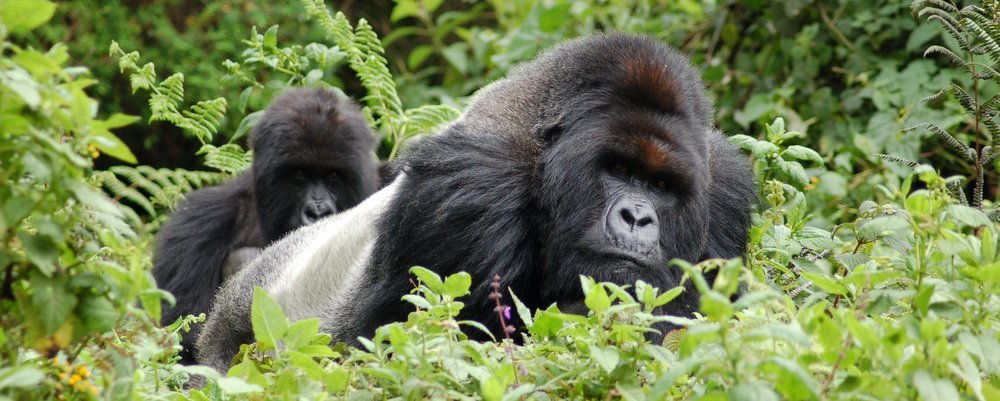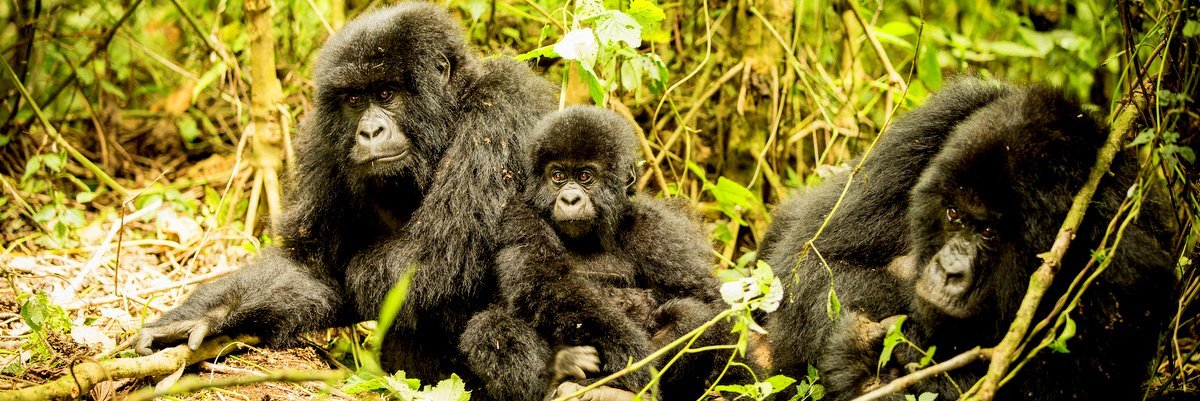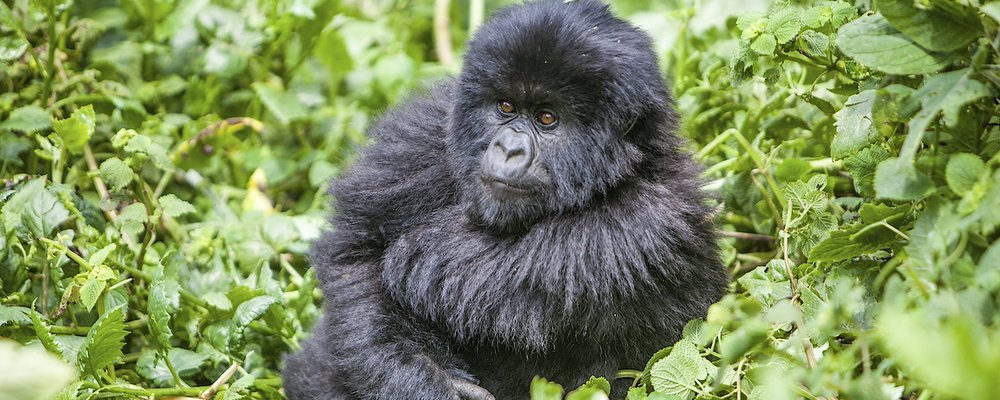Best Way To See The Mountain Gorillas
The Pros & Cons Of Mountain Gorilla Tours

Image above & banner: Joachim Huber @ flickr
It’s a once-in-a-lifetime experience: taking a tour that leads you into the habitat of mountain gorillas, where you can observe these magnificent creatures in their own home. Rather than studying their behaviours within the unnatural environment of a zoo or safari park, you will be truly stepping into the wild.
But are there any negatives to consider when planning your own mountain gorilla trekking expedition? Is it ethical to be disturbing the gorilla’s natural environment? And more to the point, is this experience definitely suitable for you?
Read on to discover everything you need to know about mountain gorilla tours in Africa.
The first thing to consider if you have expressed interest in gorilla trekking, is whether or not the experience will be suitable for you and what you would like to get out of it. The majority of ethical gorilla trekking tours are situated in Rwanda and Uganda and you should consider the expenses of getting to your chosen destination, alongside the cost of the trekking permit (which ranges from $350 to $750 dependent on location and time of year). Also, if you are planning on enjoying the experience as a family, be aware that the minimum age to be issued a permit is 15, so you will be unable to bring young children along with you.
You will have to be willing to plan in advance, as the number of permits issued per day are limited and are booked far ahead of the trek itself. You must be mobile and reasonably fit and healthy, as you will be trekking for up to eight hours through jungles and National Parks. And you must be aware that you are only permitted to spend one hour in the company of the gorillas, a rule that is enforced by law and has no flexibility.
If you would prefer to travel by vehicle and think that one hour with the gorillas is not enough, this experience is likely not for you. Once you have decided that, yes, mountain gorilla trekking is most definitely for you, the next thing to consider is where to go.

Image: Joseph King @ flickr
Bwindi Impenetrable National Park in Uganda and Rwanda’s Volcanoes National Park are the two most popular locations to travel to, and both have advanced conservation programmes in place, limiting the number of visitors each day in order to best protect the gorillas.Rwanda is generally considered to be an easier trek than Uganda, with easier hiking trails and often shorter distances to cover in order to find the gorillas. In Uganda, conditions are more tropical and you are more likely to end up on steeper trails and in the jungle.
Generally, Uganda gorilla trekking expeditions are more suitable to those who have higher levels of fitness and are after more of an adventurous experience.
Pros of a Mountain Gorilla Trek Habituation Process
The gorillas that live in Rwanda and Uganda’s National Parks are used to human exposure. They have undergone a habituation process where they are slowly exposed to human presence, so you are not going to disturb them during your visit if you behave in a considerate and respectful manner.
Source of income for local communities
When you set off on your trek, you may be offered the use of a porter to carry your daypack. Always accept, as it is a great source of income for the local people, and they will also be great company on your trek.
Helping with the conservation project
You may think that the cost of a permit to see gorillas in the wild for just sixty minutes is extensive, but be aware that it is the money raised by these permits that allows the conservation project to continue, thus securing the safety and protection of the gorillas.
Conservation is valued over profit
Although there is an exceedingly high demand for gorilla trekking, the local tour companies have not cashed in on this, and keep within the National Park’s strict guidelines for number of visitors each day and strictly abide to the one hour rule for time with the gorillas.

Image: Philip Milne @ flickr
Becoming a more well-rounded traveller
Travel isn’t all lounging on tropical beaches and staying in luxury hotels. If you wish to see the world, it is important to visit less affluent countries and to experience nature at its wildest. Visiting Africa will expose you to a completely different side of travelling and will hopefully make you more aware of the challenges that people face each day and the importance of wildlife preservation.
Tourism is important for the economy
Tourism is incredibly valuable to the economy in African countries, and the majority of tourist activities in this region concentrate on viewing animals such as the mountain gorillas. If considering ethical pros and cons against travel, it is important to remember that African countries are in need of tourism more than some of the more popular tourist destinations.
Cons of a Mountain Gorilla Trek
The risk to the gorillas
Although many precautions are taken, and the number of visitors per day is strictly limited, it is still important to consider that this is not a natural experience for the gorillas. If you are feeling unwell, you should never partake on a gorilla trek, as they are susceptible to our illnesses yet have no immunity. This means that even the common cold can wipe out an entire family of gorillas.
The treatment of the Batwa people
When Uganda’s National Parks were created in the 1990s with the intention of protecting the gorillas, the local Batwa people were forcibly removed from their homes. The majority of these people still live around the border of the parks today, struggling to make a living as their land was taken away from them without their consent.
Your carbon footprint
If you are weighing up the ethics of mountain gorilla trekking, than you have more than likely already considered your carbon footprint and the environmental costs of the transport that you will take to travel the thousands of miles to reach your destination.
Disturbing the natural environment
No matter how careful you are not to damage plants, not to drop rubbish and not to disturb the environment in which the gorillas live, you are still venturing into a land that humans are not supposed to be in. This is another reason why visitor numbers are strictly limited, but you must be aware that even the footsteps that you leave behind are altering the natural environment.
General Rules
Although the destinations that we mentioned previously have well known conservation programmes and are the most ethical options, there are several rules to abide to when mountain gorilla trekking.
 | Never feed the gorillas. |
 | Do not go gorilla trekking if you are ill or think you may be becoming ill. |
 | Wash and sanitise your hands prior to the trek. |
 | Do not eat or drink near the gorillas. |
 | Do not touch or provoke the gorillas. |
 | Do not interact with the gorillas in any way. They are wild animals, thus are unpredictable. |
 | Do not purchase any souvenirs that are made out of wildlife products. |
 | Do not encourage your guide to get closer to the gorillas or ask to spend more time with them than is allowed. |
 | Speak quietly, do not make any sudden movements, and do not make any loud noises. |
 | Do not use flash photography. |
Emma Lavelle is a UK based writer and photographer and has her own blog Field and Nest.















